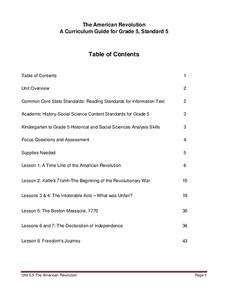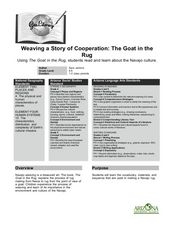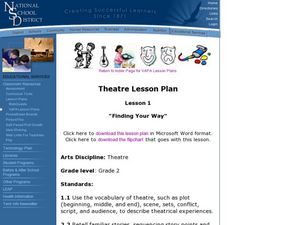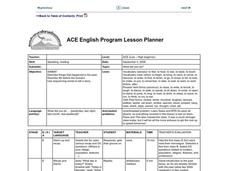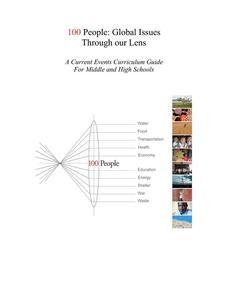Curated OER
"The Drum"
Second graders read and discuss the folktale "The Drum" from India. They also answer story comprehension questions, complete an adjectives and verb worksheet, and label a map of India. Students sequence events from the story and make...
Curated OER
Practice Book O
Whether you need resources for reading comprehension, literary analysis, phonics, vocabulary, or text features, an extensive packet of worksheets is sure to fit your needs. Based on a fifth-grade curriculum but applicable to any level of...
Curated OER
My First Biography: Christopher Columbus Storia Teaching Guide | Scholastic.com
Sail with Christopher Columbus on a biographical reading adventure. Young explorers learn about the life of Sir Columbus as they hone their comprehension skills through guiding questions, shared reading, and fluency practice. Included in...
California State University
The American Revolution
Invite your class on a ride through the American Revolution. Young historians travel through time as they explore the events that led to the foundation of the United States of America. Over the course of eight lessons, this unit provides...
Curated OER
Weaving a Story of Cooperation: The Goat in the Rug
Weaving is an important part of Navajo culture. Read The Goat in the Rug to your fourth and fifth graders, and give them a glimpse into the process of rug making from the point of view of a goat! They will learn new vocabulary words and...
Curated OER
Sequencing
Second graders retell a story focusing on sequence. in this sequence instructional activity, 2nd graders read the story Carry Go Bring Come by Vyanne Samuels. They retell parts of the story and put them in the correct order.
Curated OER
Sequencing: Beginning, Middle, End
For this sequencing worksheet, students draw 3 pictures, showing the beginning, middle and end of a stories about making pizza and getting ready for school.
Curated OER
Which Way? Ordering Story Events
In this ordering events instructional activity, learners read a 3 paragraph story, then correctly order a set of 6 events. Worksheet contains links to additional activities.
Curated OER
Pumpkin Carving Sequencer
Students arrange illustrations in sequential order. In this text organization instructional activity, students access a webpage where they must follow the instructions to learn about the steps of pumpkin carving. Students then click and...
Curated OER
Story Pyramid
In this pyramid graphic organizer worksheet,students use the story organizer to sequence the events in a story. Students describe the five parts of the story.
Think Like A Programmer! Puzzlets Cork the Volcano Curriculum
Common Core Standards Connected
The standards listed below are standards from the Common Core Framework which map to learning opportunities with Cork The Volcano & Puzzlets.
Source Link: http://www.corestandards.org/
Grade...
Curated OER
Theatre Lesson Plan: Finding Your Way
Second graders identify story elements in familiar stories from their lives. For this story elements lesson, 2nd graders act out familiar activities by following directions. Students read a story and discuss the story elements. Students...
Curated OER
Chronological Order of Events in a Story with a Flashback
Fourth graders read the story Leaving Home and put the story events in chronological order. In this chronological order lesson plan, 4th graders use index cards and refer to the flashbacks in the story.
Curated OER
Which Way???
In this story sequence worksheet, learners read a few paragraphs about a genie who granted wishes to a boy. Have your class number six story events to show the correct sequence. Kids can also learn the lesson "be careful what you wish for!"
For the Teachers
Cause and Effect Matrix
Study cause and effect in both literature and informational text with a lesson designed for several different reading levels. After kids review the concept of cause and effect, they read an article or story and note the causes and...
Hood River County School District
Text Structure: Features and Organization
Teach learners how to interact with both fiction and non-fiction text with a packet of activities and worksheets. After looking over text structure and the difference in text features between different types of writing, readers analyze...
Curated OER
What Did You Do?
English learners practice using the past tense by participating in a time description activity. They identify the differences between verbs when they are used to describe current events or past events. Students answer questions using...
Houghton Mifflin Harcourt
American Stories: Extra Support Lessons (Theme 2)
Here's a packet designed especially for those kids who need extra support with the basic concepts in the Houghton Mifflin Harcourt thematic units on American stories.
Curated OER
The Jacket: Journal Templates Teacher's Guide
Explore this story involving prejudice and racism to enhance learners' comprehension skills. The story The Jacket by Andrew Clements involves an African American boy who is falsely accused of stealing someone's jacket. This teacher's...
100 People Foundation
100 People: Global Issues Through Our Lens
If the world were 100 people...17 would not have access to safe drinking water, 18 would not be able to read or write, and 52 would not have a primary education. Using the theme of "100 people," this resource explores other major issues...
Smithsonian Institution
A Ticket to Philly—In 1769: Thinking about Cities, Then and Now
While cities had only a small fraction of the population in colonial America, they played a significant role in pre-revolutionary years, and this was certainly true for the largest city in the North American colonies: Philadelphia. Your...
Curated OER
Parts of the Plot: Constructing a Plot Diagram
Sixth graders conduct a plot diagram for a short story. They identify the problem, the rising action, the climax, the falling action, and the resolution. Students are able to sequence events in a story, and identify the parts of the plot...
Scholastic
So That's the Reason!
Make sure your pupils can hit the target when analyzing cause and effect by practicing with this worksheet. On each arrow, pupils write a cause of an event in a story, and on each bullseye, they write the effect.
Curated OER
Sequence Of Events
Third graders are introduced to the concept of sequence of events. They work in groups to properly sequence The Three Little Pigs, then work individually to write their own stories about their individuality.
Other popular searches
- Sequencing Events in Reading
- Sequence Events and Reading
- Sequencing Events Reading
- Sequence of Events Reading
- Sequence of Events in Reading





